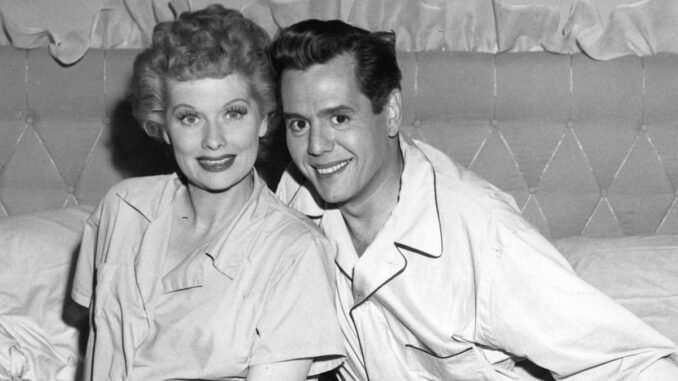
Lucille Ball wasn’t just a hilarious actress; she was a shrewd businesswoman. Most people know her as the comedic face of I Love Lucy, but her success story goes far beyond her iconic television role. Ball’s smart business decisions, particularly one pivotal move involving ownership rights, transformed her into a television mogul. But what was this decision? And why does it remain one of the most brilliant in entertainment history?
Let’s unravel the story of how one decision turned Lucille Ball into an entertainment powerhouse and paved the way for future generations of stars.

The Origin of ‘I Love Lucy’
Lucille Ball’s rise to stardom wasn’t immediate. Before I Love Lucy, Ball had already established herself as a talented comedic actress in Hollywood. However, it wasn’t until 1951, when CBS picked up I Love Lucy, that Ball’s life and career changed forever. The show was an instant hit, drawing in millions of viewers and skyrocketing Ball and her husband, Desi Arnaz, to fame.
Desi Arnaz: A Key Player in the Decision
While Lucille was the face of the show, Desi Arnaz played a crucial role behind the scenes. As the producer of I Love Lucy, Arnaz had a sharp eye for business. Together, Lucille and Desi formed Desilu Productions, which would later become a television empire.
The Revolutionary Ownership Deal
At the time, networks like CBS would own the rights to any show they aired. However, Desi Arnaz had a different vision. He believed that I Love Lucy would have longevity and future profitability. Arnaz and Ball made a groundbreaking request: they wanted to retain the ownership rights to I Love Lucy. In exchange, they agreed to take a pay cut.
CBS, not anticipating the potential for future syndication, agreed to the deal. It would later turn out to be one of the most lucrative decisions in television history.
The Power of Syndication: How It Changed TV Forever
The ownership of I Love Lucy allowed Desilu Productions to control the syndication rights. This was an unheard-of concept at the time. Once the show ended, they could continue to make money by selling reruns of the show to other networks and local stations.
The syndication of I Love Lucy was a game-changer. Even today, reruns of the show air across the globe, generating revenue for Lucille Ball’s estate and demonstrating the power of residual income.
A New Model for Future TV Shows
This decision didn’t just impact Lucille Ball’s fortune; it set a new standard for television actors and producers. Actors began negotiating for partial ownership of their shows, a trend that continues today. Stars like Jerry Seinfeld, Larry David, and others followed in Ball’s footsteps, reaping enormous profits through syndication deals.
The Birth of Desilu Productions
With the success of I Love Lucy, Lucille and Desi expanded Desilu Productions into one of the most powerful television production companies in Hollywood. They didn’t just stop at producing their show—they took on other major projects, including The Untouchables and Star Trek.
Lucille Ball Becomes the First Female Studio Head
After her divorce from Desi Arnaz in 1960, Lucille Ball bought out his share of Desilu Productions, making her the first woman to head a major television studio. She continued to grow the company, producing hit after hit. This move solidified her position not just as an actress but as a television mogul.
Breaking Gender Barriers in Hollywood
Lucille Ball’s position as the head of Desilu Productions shattered the glass ceiling for women in Hollywood. At a time when women were often relegated to acting or behind-the-scenes roles, Ball proved that women could run successful companies, make major financial decisions, and lead in a male-dominated industry.
The Sale of Desilu Productions: A Multimillion-Dollar Payday
In 1967, Lucille Ball made another brilliant business move: she sold Desilu Productions to Gulf+Western for $17 million. At the time, this was one of the largest corporate acquisitions in Hollywood history. The sale not only secured Ball’s financial future but also cemented her legacy as a trailblazer in both business and entertainment.
Legacy of Lucille Ball’s Decision

Lucille Ball’s genius business decision to retain the rights to I Love Lucy left a lasting impact on the television industry. Today, actors and producers owe much of their financial success to the precedent she set. Her foresight helped shape modern television, proving that actors could have a stake in the success of their shows long after the cameras stopped rolling.
How ‘I Love Lucy’ Is Still Making Money Today
Reruns of I Love Lucy continue to air on TV channels worldwide, more than 70 years after its debut. The show’s syndication rights continue to generate revenue, making I Love Lucy one of the most profitable shows in television history. Lucille Ball’s estate still benefits from the decision she and Desi made in the 1950s.
Why This Decision Is a Business Masterclass
Lucille Ball’s decision to retain ownership rights to I Love Lucy wasn’t just a fluke—it was a masterclass in business strategy. It showed the power of thinking ahead and understanding the long-term value of intellectual property. Her ability to leverage her influence and take control of her work is a lesson for anyone seeking to build generational wealth.
The Enduring Popularity of Lucille Ball
Lucille Ball remains a beloved figure in popular culture, not just for her comedic genius but for her business acumen. She proved that women in Hollywood could be more than just entertainers—they could be leaders, innovators, and moguls. Her legacy continues to inspire generations of actors, entrepreneurs, and business leaders.
Conclusion: A Legacy of Laughter and Leadership
Lucille Ball’s brilliant decision to retain the rights to I Love Lucy changed her life and career forever. More than that, it changed television history. Ball’s savvy business sense and willingness to take a risk set her apart as one of Hollywood’s most influential figures. Her story is not just one of laughter and entertainment but of leadership, vision, and bold decision-making. Lucille Ball truly was one of a kind.